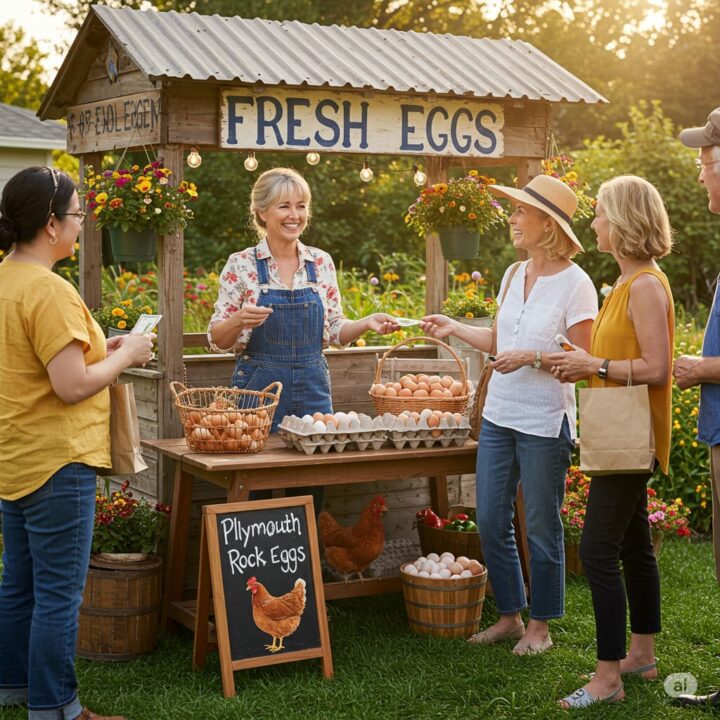Last updated on June 13, 2025
Imagine offering the freshest, most beautiful brown eggs right from your backyard. Thinking about selling Plymouth Rock chicken eggs? That’s a really cool idea! These chickens aren’t just nice to look at. They are really good at laying eggs. Selling eggs is more than just picking them up. It’s about sharing fresh food with people in your town. I’ve been raising chickens and selling eggs from my backyard flock of Plymouth Rocks for over five years now. I started small and learned a lot along the way about running a little egg business. It’s a fun way to make a little extra money and connect with your community. Let me share what I know to help you get started with your own egg business, drawing from my hands-on experience.
Why Pick Plymouth Rock Chickens for Eggs?
Let’s be honest, are Plymouth Rock chickens good for eggs? Yes, absolutely! Plymouth Rock chickens are known for being excellent layers. In my time raising different kinds of chickens, I’ve found Plymouth Rocks lay a lot of eggs consistently. They are an old kind of chicken from America. People have kept them for a long, long time because they are useful. They are strong birds, friendly, and lay eggs pretty often. They do well in hot or cold weather. That’s great for backyard chickens in many places. Also, they are calm birds. This makes taking care of them easier and more fun. Calm chickens are also less stressed, and that helps them lay more of those valuable brown eggs! You can learn more about Plymouth Rock chicken characteristics to see if they’re the right fit for your flock.
Here’s a quick look at the two most common types:





| Feature | Barred Plymouth Rock | White Plymouth Rock |
| Appearance | Black and white stripes (like bars) all over. | Solid white feathers. |
| Laying | Excellent layers, 4-5 brown eggs per week in peak. | Excellent layers, 4-5 brown eggs per week in peak. |
| Temperament | Friendly, calm, curious. | Friendly, calm, curious. |
| Hardiness | Very hardy, do well in hot and cold. | Very hardy, do well in hot and cold. |
As you can see, both are great choices for egg production!
How Many Eggs Do Plymouth Rock Chickens Lay Per Year?
So, how many plymouth rock chicken eggs per year can you expect? A healthy Plymouth Rock hen typically lays between 200 and 280 eggs each year. From what I’ve seen and what other chicken people tell me, that’s about 4 to 5 eggs every week when they are laying the most. This usually happens in their first two years. This level of egg production from Plymouth Rock layers is a great start for your egg business!
But the number can change. How many eggs they lay depends on a few things:
- Age: Production is highest in the first 1-2 years.
- Diet: Poor food means fewer eggs.
- Where they live: Stress, heat, or cold changes things.
- Time of year: They lay fewer eggs when days are short in winter. This is normal.
You can add extra light in the chicken coop in winter to help them lay more if you want to boost egg production. Be ready for the number of eggs to go up and down. But 4-5 eggs a week per hen in spring and summer is a good guess for Plymouth Rock egg production.





Is there a difference in how many barred plymouth rock chicken eggs per year you get compared to white plymouth rock chicken eggs per year? No, generally both Barred and White Plymouth Rocks have similar egg laying potential. I’ve had both kinds. They both lay about the same number of eggs. Some people might say one is a little better. But if you take good care of them, either kind will lay a lot of eggs. The important thing is to give them a good life. My Barred Rocks and White Rocks have always laid about the same for me. So, whether you have barred plymouth rock chicken eggs or white plymouth rock chicken eggs, you can expect good production.
Finding Good Plymouth Rock Chickens for Sale: Where to Buy?
Finding healthy chickens is the first step. You want birds that will lay lots of eggs for you. You can look for Plymouth Rock chicken eggs for sale if you want to hatch them yourself. This is cool! You get to see the chicks hatch. But it takes more time and you need a special machine called an incubator: A machine that keeps eggs warm and turns them so chicks can grow inside and hatch.
Or, you can buy baby chicks (day-old) or young hens called pullets. Pullet: A young hen, usually less than a year old, that is not yet laying eggs or has just started laying. Pullets are about 4-5 months old. They will start laying soon. You might be interested in when Barred Rocks start laying eggs specifically. You can buy them from a good hatchery or a local farmer who raises them. When you are looking for Plymouth Rock chickens for sale, ask about their laying history.
When you are looking, ask questions! Ask about the parent chickens. Were they good layers? Are the chickens healthy? Have they had any shots? This helps you get birds that will lay well and stay healthy. I always try to visit the farm or hatchery if I can. You can see how the chickens are kept. I once bought chicks from a cheap place. They got sick and didn’t lay many eggs. It cost me more in the end. It’s better to pay a little more for good, healthy Plymouth Rock chickens that will give you lots of plymouth rock chicken eggs!



Setting Up Their Home for Best Egg Production
Happy chickens lay more eggs. It’s like simple chicken math! Giving your hens a good place to live is very important for getting lots of plymouth rock chicken eggs. They need a safe house (called a coop). It must keep them safe from animals that want to eat them, like raccoons or foxes. One attack can scare chickens so much they stop laying for weeks!
The chicken coop also needs to protect them from bad weather. Make sure it has fresh air coming in, but no cold drafts in winter. A good rule is to give each chicken about 3-4 square feet of space inside the coop. I follow this rule for my backyard chickens.
They need plenty of space. If too many chickens are crowded together, they get stressed. This can cause them to get sick. They might pick on each other. And they won’t lay as many eggs. They also need strong bars to sleep on at night. Chickens like to sleep up high. They feel safer from danger there.
And they need clean, quiet nesting boxes to lay their beautiful brown eggs. Nesting Box: A private, comfortable spot in the chicken coop where hens prefer to lay their eggs. I like to have one nesting box for every 3 or 4 hens. If you have too many boxes, they might just sleep in them, which makes them dirty and can lead to dirty egg shells.




Food is also a very big deal. Chickens that lay eggs need special food called layer feed. Layer Feed: Special chicken food with extra protein (about 16%) and calcium for hens that are laying eggs. Calcium is super important for making eggshells strong. Strong shells mean fewer broken eggs! I always give them extra calcium in a separate dish. It’s called oyster shell. They can eat as much as they need.
Fresh, clean water is needed all the time. If chickens don’t have enough water, they can stop laying eggs very quickly. I use special water dishes that stay warm in winter so the water doesn’t freeze. Keeping the coop clean helps stop sickness. Clean bedding and checking for bugs like mites are part of good poultry farming and taking good chicken care. This all helps with consistent egg production. I clean my coop really well every few months. I also clean up droppings under the roosts every day. Plymouth Rocks also tend to thrive in free-range setups, which can contribute to their health and potentially egg quality.

Following the Rules: Selling Eggs the Right Way
Okay, your hens are happy and laying lots of beautiful plymouth rock chicken eggs. Now, how do you actually sell eggs without getting in trouble? This part can seem tricky. But following the rules is very important for egg safety. It also helps people trust your egg business. Doing things the right way protects you and the people who buy your farm fresh eggs.
What Are the Rules for Selling Backyard Chicken Eggs?
Here’s the most important thing: egg regulations are different in different places. The rules for selling eggs change depending on your state, county, or even city. What’s okay for selling a few eggs to a neighbor in one place might need papers or checks in another. You must check the rules where you live about selling eggs from your backyard chickens. Don’t skip this! It’s the main thing you need to do to sell eggs legally. Thinking the rules are the same everywhere is a mistake that can cost you later.



While I can’t give you legal advice for your specific location, here are some types of regulations that are common in many places for selling eggs:
- Refrigeration Requirements: Many states require eggs sold directly to consumers to be kept refrigerated at a certain temperature (often 45°F or below).
- Bird Limits: Some regulations have limits on the number of birds you can have before needing more permits or inspections (e.g., under 250 or 500 birds).
- Sales Location Limits: Rules might limit where you can sell (e.g., only on your farm, at a farmers market, or directly to consumers, not to restaurants or stores).
- Labeling Rules: Specific information is often required on the egg carton labeling, like your name, address, and packing date.
Where can you find these rules?
- A good place to start is your state’s Department of Agriculture website. (Look for sections on ‘eggs’ or ‘cottage foods’). For New York, visit the New York State Department of Agriculture and Markets, specifically their Home Processing section, which provides detailed information on cottage food laws and egg sales regulations.
- Or call your local office that helps farmers (sometimes called the Cooperative Extension office). In New York, the Cornell Cooperative Extension has local offices across the state, offering guidance on agricultural practices, including egg handling and sales.”
These are good places to get real information about local food sales. For general information on egg handling, the USDA also provides resources such as Shell Eggs from Farm to Table, Egg Products and Food Safety, and the USDA ARS guide on Egg Handling, Safety, and Consumption. But remember, these are federal guidelines—your state laws might be stricter, so always check with your local Department of Agriculture or extension office.
Do You Need a License or Permit to Sell Eggs?
Going along with the rules, if you need licensing, permits, and inspections depends on your local laws. For small sales directly to neighbors, you might not need a license, but for farmers markets or stores, you likely will. From what I know and what other small scale farming egg sellers tell me, if you sell just a few dozen eggs a week to neighbors, you might fall under an exemption and not need anything official.




But, and this is a big BUT, if you want to sell at a farmers market, to restaurants, or to stores, they will almost always need you to follow specific regulations. This could mean getting official papers, like a business license, or having someone check your eggs and where you keep your chickens to make sure everything is safe. Farmers markets often have their own rules too for vendors selling farm fresh eggs.
It is always, always better to know the rules for sure. Call or email your local health office or farm department. They can tell you exactly what you need to do for the kind of selling you want to do. Trust me, they usually want to help small farmers understand the rules. Don’t just listen to what people say online. Get the facts from the real source for your area. I made sure to ask for the rules in writing when I called my county office. That way, I had a clear record for my egg business.
How to Keep Eggs Clean and Handle Them Safely
Keeping your eggs clean is very important when you sell eggs. People who buy from you expect safe food. They want clean eggs. How you handle them is key to building trust. Should you wash your eggs? This is something chicken people talk about a lot!
In big egg farms in the US, eggs are usually washed. Then they put a thin layer of oil on them. This oil takes the place of something natural on the eggshell called the “bloom.” Bloom: A natural, thin protective layer on the outside of an eggshell that helps keep bacteria out. The bloom is like a natural cover that helps stop bad germs from getting inside the egg. Washing the egg takes this bloom off. If you wash eggs, they can get germs inside more easily unless you keep them cold.



If an egg has dirt or poop on it, you must clean it before selling it. Here are steps for cleaning eggs safely:
- Try dry cleaning first: Use a brush or a dry cloth to gently rub off dirt. This helps keep the bloom.
- If washing is needed: Use water that is warmer than the egg (at least 90°F). This stops the inside of the egg from pulling germs in.
- Use special soap: Use a little bit of soap made for washing eggs.
- Clean your area: Keep the place where you wash and store eggs clean. Wash your hands too!
- Keep them cold: Always put cleaned eggs in the refrigerator right away. They need to be kept cold, below 45°F.
Following good egg washing and handling requirements is a must. It makes sure your farm fresh eggs are safe and keeps people happy with your quality. I usually don’t have to wash many of the eggs from my backyard flock because their nesting boxes stay clean. But when I do, I wash them carefully.
Packaging and Labeling Your Plymouth Rock Chicken Eggs
Your nice farm fresh eggs need good boxes to go in! These are called cartons. Using old cartons again is good for the planet. Many customers like this. I find most of my customers are happy to bring back their old cartons. But again, check your local rules! Some places say you must use new, clean cartons when you sell eggs. No matter if they are new or old, make sure the cartons are clean and strong. They need to protect the eggs so they don’t break. Nobody wants a broken egg!
Egg carton labeling is often needed, even for small sales. It’s also a good idea even if the law doesn’t say you have to. It tells people important things and helps them trust you. Here’s what labeling often includes:



- Your name and where you live (your address).
- The date you collected or put the eggs in the carton.
- Sometimes, a statement like “Unwashed Eggs” (if allowed).
- Often, a safe handling message like “Keep Eggs Cold” or “Cook Eggs Well to Stay Safe.”
Putting this info on the carton is honest. It helps people trust your egg business. You can also make your cartons look nice! Put a simple sticker on them with your farm name. Maybe add a drawing of a happy chicken. This helps people remember your plymouth rock chicken eggs! I made simple stickers with my name and phone number. My customers like them!
How to Price Your Plymouth Rock Chicken Eggs for Profit
Okay, you followed the rules, and your hens are laying like crazy! Now for the fun part: figuring out egg pricing. You need to decide how much to charge for those beautiful plymouth rock chicken eggs. It’s a mix of knowing your costs and seeing what others charge. Getting the price right helps your egg business make money.
What Does It Cost You to Produce Eggs? Figuring Out Expenses
Before you put a price on that carton, you need to know what it costs you to get those eggs. Your costs to produce eggs include feed, supplies, and even your time. This is more than just the cost of chicken feed costs. Feed is usually the biggest cost, but there are others. Think about how much you paid for the chicks or hatching eggs when you started. Add the cost of raising them until they lay. This includes food, heat lamps, and little water dishes.
Also, think about things you buy often, like bedding for the coop, grit (small stones chickens eat to help grind food), oyster shell for calcium, and any medicine or vet visits. Don’t forget the cost of the coop and equipment (feeders, waterers, nesting boxes, egg baskets, cartons). These things last a while, so you spread their cost out over the years. For example, if your sturdy coop cost $500 and you think it will last 10 years, that’s $50 a year in housing cost. You divide that yearly cost by how many dozens of eggs you sell in a year. This helps you figure out your cost per dozen for your plymouth rock chicken eggs.
Here’s a simple breakdown of common costs:
| Cost Category | Examples |
| Feed | Layer feed, chick starter, grit, oyster shell |
| Supplies | Bedding (shavings, straw), cleaning supplies |
| Equipment (Annual) | Portion of coop, feeders, waterers, nesting boxes |
| Cartons | New cartons or cost/time for cleaning used ones |
| Health | Vaccinations, medications, vet visits |
| Time Value | Your time for care, collecting, selling, records |
And please, please remember your time is worth something! Cleaning the coop, feeding, watering, checking on them, collecting eggs, cleaning eggs, putting them in cartons, telling people you have eggs, selling them, keeping track of money—it all takes time. Your time is important. Think about how many hours a week you spend on chicken stuff. Add that into your cost. Knowing your real cost for each dozen eggs helps you set a price. This price should be high enough so you don’t just pay for your costs, but also make some money. This makes it a profitable hobby. I write down everything I spend in a simple list. It really helps me see where my money is going. My cost for a dozen eggs from my Plymouth Rock layers changes. It depends on the time of year and how much feed costs. But I know my average cost.
What Are Others Charging Locally? Checking Market Prices
You need to look around and see what others are charging for eggs near you. Check prices at your local farmers market and small stores to see what others are charging for backyard eggs. Go to your local farmers market. How much are other people selling backyard chickens eggs for? Look at small local stores or food co-ops that sell eggs from local farms. Sometimes, groups online for local food or your town can give you an idea of prices.
Prices can be very different depending on where you live (cities usually have higher prices than the countryside). How many people want local eggs also changes the price. And what makes the eggs special? Are the chickens organic? Do they roam free in a field? Farm fresh eggs from local sources almost always cost more than eggs from the grocery store. This is because people know they are fresher and often from chickens that are cared for better. Your plymouth rock chicken eggs are special! So, you can charge a good price for them. Don’t be scared to charge what they are worth. I started charging a little less when I began selling my Plymouth Rock eggs. But I saw others at the market charging more for eggs that weren’t as special as mine. I learned to charge a fair price for the quality I offer.
What Makes Your Eggs Worth More? Factors Influencing Price
Several things make your plymouth rock chicken eggs special and can help you charge a good price. Quality, freshness, and how your chickens are raised all add value and influence your egg price. Quality and freshness are the biggest things. Eggs you picked up yesterday and kept cold are worth more than old eggs. The fact that they are truly farm fresh eggs from backyard chickens you raised with care is a big plus for people who want local food. They like knowing where their food comes from. I always tell my customers that my hens run around in the yard. They eat bugs and enjoy sunshine – that adds value for many customers.
The kind of chicken can also matter. The plymouth rock chicken eggs color is usually a nice brown. Brown eggs are very popular. Some people look for eggs from certain kinds of chickens. If you ever got chickens that lay colored eggs, like blue or green ones (from breeds like Easter Eggers), those often sell for more money because they look cool and are different. But don’t forget how good a classic brown egg from a trusted chicken like a Plymouth Rock is! Both barred plymouth rock chicken eggs and white plymouth rock chicken eggs will be brown, and their consistent quality, good size, and the reputation of the breed are strong points. How you raise your chickens (if they run free, if they eat organic feed) also makes them more valuable. Be ready to share the story of your chickens and your egg production methods!
Setting a price means finding a balance. You need to cover your costs. You need to be fair compared to others selling eggs near you. And you need to show the great quality and freshness you offer. Don’t charge too little! Your eggs are probably better than store eggs. People will pay more for that. Think about selling different sizes of eggs for slightly different prices.
Selling Your Eggs: Getting Them to Customers
You know your price. Now let’s get selling! Selling your Plymouth Rock chicken eggs locally is about finding people who want local food and farm fresh eggs. It’s about meeting people and building connections.
Who Will Buy Your Eggs? Finding Customers
Think about who is most likely to buy from you and where they are. Potential customers for your backyard chicken eggs include neighbors, friends, coworkers, and people at farmers markets. Neighbors are often the easiest people to sell to. They see your chickens (or hear them!), they know you, and it’s easy for them to buy.
Friends, family, and people you work with (coworkers) are also good customers to start with. People who go to farmers markets are already looking for local things. Maybe there’s a small coffee shop or bakery nearby that likes to use local food? Thinking about who wants your Plymouth Rock eggs helps you know the best way to find them. Are you trying to sell to busy families? People who care a lot about healthy food? Or maybe local cooks?
Selling Directly: The Personal Touch
Selling eggs right from your home is often the best way to make the most money. Direct sales methods like roadside stands or on-farm sales let you keep all the profit. You get to keep all the money you make. You also get to meet your customers!
A simple roadside stand with a box for money can work if you live on a road with some cars going by. But check if your town has rules about selling things by the road. Make sure your farm stand is visible and inviting.
Selling on-farm sales, where people come to your property, lets customers see where their food comes from. If you are okay with it, they can see your happy chickens! This helps people trust you a lot.
Selling door-to-door in your neighborhood can also work when you are starting. Tell people you have Plymouth Rock chicken eggs for sale. When customers are happy, they will tell their friends. That’s great advertising for your egg business!
Selling Through Local Channels: Farmers Markets, Stores, and Restaurants
Want to sell more eggs? You can sell your farm fresh eggs through local channels like farmers markets, restaurants, or stores. Selling at a farmers market is a classic way for people with backyard chickens. You will be where people are looking for local things. But be ready to wake up early! You might also have to pay a fee to have a spot at the market. And you might need special papers, like we talked about. Make your spot look nice with your clean cartons and maybe a sign about your farm and your Plymouth Rock eggs. Selling to restaurants or to stores usually means selling a lot of eggs all the time. They might want to pay a little less for each dozen. You might need to sign papers with them and send bills. The rules for selling to businesses can be stricter. But it can be good if you have lots of plymouth rock chicken eggs and want to sell them regularly.
Using the Internet and Social Media to Sell Eggs
Don’t forget about the internet! Online platforms and social media can help you reach local customers to sell your eggs. Local groups on Facebook about food, farming, or your town can be good places to tell people you have Plymouth Rock chicken eggs for sale. Put up nice pictures of your eggs and chickens!
Facebook Marketplace is another place to list your eggs. Just make sure you follow Facebook’s rules about selling food. Sharing pictures and short videos of your happy hens and clean coop on places like Instagram can also get people interested. It shows them how much care goes into your egg production.
You can also start a simple email list. Send emails to your regular local customers to tell them when you have farm fresh eggs ready. It’s a good way to stay in touch.
Building Customer Relationships for Repeat Business
The best way to have a good egg business for a long time is to have customers who buy from you again and again. Building strong customer relationships leads to repeat business and a successful egg business. It’s much easier and cheaper to keep an existing customer than find a new one! Be friendly when you sell eggs. Make sure your eggs are always good quality. Be there when you say you will be. Try to remember your customers’ names.
Maybe give them an extra egg sometimes. Or give them a free dozen after they buy a certain number. People like feeling special. When they know you and see you take good care of your egg laying hens, they will keep coming back for your farm fresh eggs. Taking good chicken care and being nice to people helps your flock management and makes customers happy. Happy customers are the best!
Is Selling Plymouth Rock Chicken Eggs Profitable? (Let’s Crunch the Numbers)
So, after all this work, care, and marketing, can you actually make money selling Plymouth Rock chicken eggs from your backyard? Yes, selling Plymouth Rock chicken eggs can definitely be a profitable hobby or a small business.
From my experience and seeing other people do it, you totally can! Will you get rich fast? Probably not enough to stop your other job right away. But it can be a profitable hobby. It can also give you extra money. You just need to be smart about your costs and how you sell those plymouth rock chicken eggs. You have to think of it like a small business.
How to Know if You’re Making Money: Tracking Income vs. Expenses
You absolutely must keep track of the money coming in and going out. Tracking income and expenses is essential for knowing if your egg business is profitable. This is not just an option! If you don’t, you won’t know if you are making money or just spending it.
Use a simple notebook or a list on your computer. Write down every time you sell eggs and how much money you get. Write down every penny you spend on feed, bedding, things for the coop, the cost of the chicks when you bought them, and anything else for the chickens or selling eggs. This is the only way to see if you are making money. Remember to include the cost of your coop and equipment over time. This is called depreciation. You divide the cost by how many years you use it.
Seeing all the numbers helps you know if you are making money. It also shows you where you might be spending too much. You can figure out how much it costs you to get one dozen eggs. Mine costs about $2.50 to $4.00 per dozen for my Plymouth Rock eggs. Knowing this helps you set a price so you make money.
Getting More Eggs to Sell: Maximizing Production
The more eggs your healthy hens lay, the more you have to sell! Maximizing egg production from your Plymouth Rock hens requires excellent care and management. Getting the most egg production means taking excellent chicken care and meticulous flock management.
High-quality layer feed specifically formulated for laying hens, clean water available 24/7, a stress-free environment (protection from predators, adequate space, not too hot or cold), and adequate light exposure (especially in winter – using supplemental light on a timer in the coop to provide 14-16 hours of light can help maintain production when natural daylight is short) are key factors for good Plymouth Rock egg production.
I use a simple LED bulb on a timer set from 6 AM to 8 PM in the winter, and it makes a noticeable difference in keeping production steadier. Regularly assessing your flock and culling older hens (typically after 2-3 years, production starts to decline) whose production has significantly dropped is part of smart poultry farming from a business perspective; they still eat feed but aren’t contributing enough to your egg supply. Replacing 1/3 of your backyard flock each year with new pullets can help maintain consistent egg production.
Making More Money: Boosting Profit
Look for ways to spend less money on each dozen eggs. Strategies for increasing profit margins include reducing costs and offering added value to your egg sales. Can you buy feed in big bags to save money? Can you grow some treats for your chickens, like sprouts or worms? Can you use the chicken poop to make fertilizer for gardens? You can even sell this composted poop to gardeners! Are there ways to make your chicken work faster so you save time? Remember, your time costs money too.
You can also charge a little more for your eggs if many people want them. Your farm fresh eggs are better quality, so people will pay more. But check what others charge in your area. Offering extra things, like bringing the eggs to your customers’ houses or having them pay you each week to get eggs regularly, can also help you charge a little more. These strategies help increase your profit margin when selling eggs from Plymouth Rocks.
More Than Just Eggs: Exploring Other Income Streams
Your backyard chickens can give you more than just eggs to eat. Other income streams from your poultry farming can include selling hatching eggs or surplus birds. If you have a rooster and are raising a desirable breed like Plymouth Rocks, you could sell hatching eggs to people looking to start their own flock or use an incubator.
Barred Plymouth Rock chicken eggs are particularly popular for hatching. This is because the chickens are so liked, and the chicks usually look just like the parents. While pure Plymouth Rocks lay brown eggs, if you happened to cross them with a blue egg layer (like an Ameraucana or Easter Egger), you could potentially sell blue plymouth rock chicken eggs for hatching! People really like hatching colored egg layers because it’s fun to see what color eggs the chicks will lay.
Selling young hens that are just starting to lay is another way to make money. These are called pullets. Good, composted chicken poop (manure) can also be put in bags and sold to people who garden. Don’t forget about these other ways to make money from your poultry farming! I sell my extra composted poop for a few dollars a bag. It adds up!
Is It Worth the Work? Evaluating Time and Effort
Finally, you need to think about how much time and effort investment this takes. Raising and selling eggs requires a significant time commitment, but many poultry keepers find it rewarding. Raising chickens is work you do every day. You have to feed them, give them water, check on them, and pick up eggs. Selling eggs means more work: putting them in cartons, telling people you have them, meeting customers, and keeping track of money. Is the money you make worth the time you put in?
For many of us poultry keepers, including me, the good feelings you get are worth it. It feels good to raise your own food and share it. It feels good to connect with people who want local, healthy food. And honestly, spending time with those friendly Plymouth Rocks is just plain fun! They have funny ways and are great friends to have in the yard. It’s a lot of work, but it’s good work. It’s not just a business; it’s a way of life that connects you to nature and your neighbors.
Showing Off Your Story: Pictures Help A Lot
I can’t show you pictures here, but I have to tell you how important they are for selling your farm fresh eggs. Pictures help people see how great your eggs and chickens are! They help people feel good about buying from you.
Here are some ideas for pictures:
- Your Chickens: Show your happy, healthy Plymouth Rocks walking in the grass or taking a dirt bath. This shows people you take good chicken care. It’s a big reason why people buy backyard chickens eggs.
- Your Setup: Pictures of your clean chicken coop and yard show you are a good chicken keeper.
- Your Eggs: Take close-up pictures of your beautiful plymouth rock chicken eggs in their cartons. Maybe put a flower or some straw next to them. They look really nice! Show off that pretty brown egg color!
- Your Work: A picture of you picking up eggs, or putting them in cartons, makes it feel more real. It shows they are truly “farm fresh.”
- Happy Customers (Ask First!): If someone is really happy with your eggs, ask if you can snap a photo of them with the eggs to share online. Always ask permission first!
Use these photos on places like Facebook, Instagram, flyers, or a simple website. They tell your story better than just words. They show people you are real and care about your chickens and eggs. This helps you sell eggs more effectively.
Frequently Asked Questions About Selling Plymouth Rock Eggs
Here are some common questions people ask about raising and selling eggs from Plymouth Rock chickens:
Do Plymouth Rock chickens lay brown eggs?
Yes, purebred Plymouth Rock chickens, including both Barred and White varieties, lay brown eggs.
How many eggs do Plymouth Rock chickens lay per year?
A healthy Plymouth Rock hen can lay between 200 and 280 eggs per year. This level of egg production per year makes them a great choice for a small egg business.
Are Barred Rock chickens good layers?
Yes, Barred Plymouth Rocks are considered excellent layers. They are similar in egg production to White Plymouth Rocks.
Do I need a license to sell backyard chicken eggs?
It depends on where you live. Egg regulations vary by state and local area. For small sales directly to consumers, you might not need a license, but for farmers markets or stores, you likely will. Always check your local laws regarding selling backyard chicken eggs.
How much do backyard chicken eggs sell for?
The price varies based on location, demand, and quality. Backyard chicken eggs, especially farm fresh eggs from breeds like Plymouth Rocks, usually sell for more than grocery store eggs. Check prices at your local farmers market to get an idea.
Should I wash my backyard chicken eggs before selling them?
Many people prefer not to wash backyard chicken eggs unless necessary to preserve the natural protective bloom. If an egg is dirty, you can try dry cleaning first. If washing is needed, use water warmer than the egg and store them in the refrigerator. Always check your local regulations regarding egg washing and handling requirements for selling.
Last Thoughts: Is Selling Plymouth Rock Eggs Right for You?
So, that’s a lot of info! We talked about why Plymouth Rock chicken eggs are great for selling (they lay well and people like them!). We covered how to start your flock and take good care of them (from my over five years of learning!). We went over the important rules about selling eggs (check your local laws – it’s crucial!). We talked about figuring out your egg pricing based on your costs and what others charge. And we talked about how to get those nice farm fresh eggs to people who want them. It takes work, but it’s a good thing to do.
Turning your backyard chickens into a little egg business is work, yes. But for me, and many other people who do small scale farming, the good feelings are worth more than just the money. It feels really good to raise your own food and share it. It feels good to connect with people who want local, healthy food. And honestly, spending time with those friendly Plymouth Rocks is just plain fun! They have funny ways and are great friends to have in the yard. It’s a lot of work, but it’s good work. It’s not just a business; it’s a way of life that connects you to nature and your neighbors.
If you want a profitable hobby that connects you with nature and your town, or you want to try small scale farming, picking Plymouth Rock chicken eggs is a smart choice. They lay eggs reliably, they are pretty easy to care for, and people always want their brown eggs. It’s a business you can feel really good about. It’s built on taking good care of your chickens and being honest with your local customers.
Are you already a poultry keeper selling eggs? Or are you just thinking about starting? What questions do you have about selling Plymouth Rock chicken eggs? I’d love to hear from you and share more from my own experience! Share your experience below or ask me anything in the comments! Let’s talk chickens!


